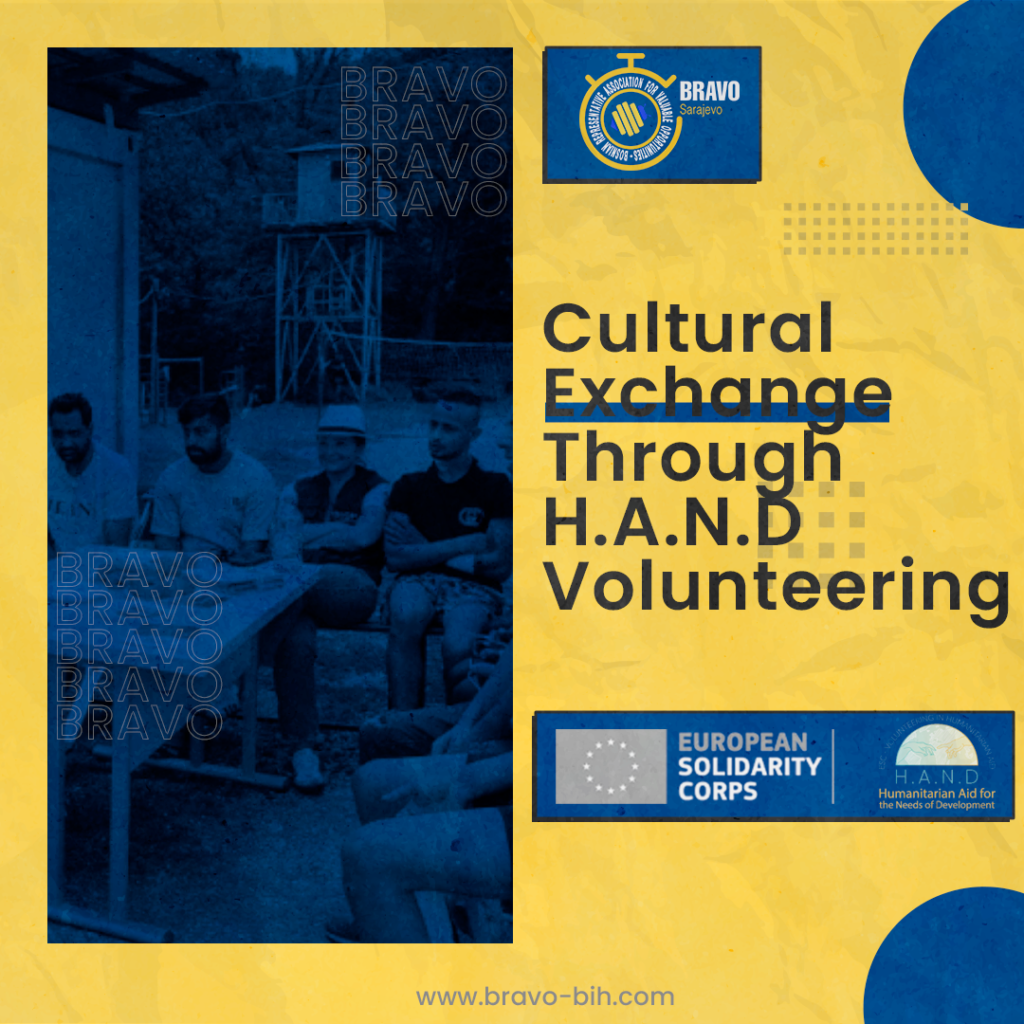
Volunteering isn’t just about helping others. But it’s also about learning from them. When people from different countries come together to work on a common goal, something amazing happens, and that’s called cultural exchange. This is what we’ve seen over and over again through the work of our volunteers in Temporary Reception Centers (TRCs) in Bosnia and Herzegovina.
What Is Cultural Exchange?
Cultural exchange happens when people from different backgrounds are sharing their traditions, languages, and ways of life, and that’s what BRAVO is strongly supporting. It’s about understanding and respecting each other’s differences. When this happens, barriers like stereotypes and prejudices start to break down, and people come together as equals.
In our TRCs, volunteers from countries like Poland, Turkey, Italy, France etc. worked side by side with local communities and migrants from all over the world.
These interactions weren’t just about providing support, and helping people in need, they are opportunities to learn from one another and build mutual respect.
Why Is Cultural Exchange Important in Volunteering projects such as H.A.N.D.?
When volunteering involves people from different cultures, it becomes a two-way street. Working in diverse teams is helping our volunteers to see the world through others’ eyes. This is especially important in TRCs and volunteering, where migrants often come from challenging situations. Understanding their cultural backgrounds, customs, culture, religion etc. helps volunteers connect with them on a deeper level than just doing their volunteer tasks.
Cultural dialogue is a key skill in today’s world. It’s all about communicating respectfully and finding common ground despite differences. Our volunteers learned how to adapt, listen, and work together, which are valuable skills for life, and we are very proud that project such as H.A.N.D. was able to give them strong platform for developing those skills.
Meeting people from different cultures helps challenge stereotypes. For example, most of the volunteers shared how their views about certain countries or traditions changed after working in the TRCs. Cultural exchange is actively fostering a sense of unity. It reminds us that, despite our differences, we all share common values like kindness, hope, and the desire for a better future, and that’s what matters.
Stories of Cultural Exchange from our volunteers perspective
One of the best examples of cultural exchange was a special event we organized: a Cultural Dinner. Each volunteer brought or prepared a dish from their home country. The table was filled with flavors from around the world, including Turkish baklava, French crepes, German pretzels and much more.
The dinner wasn’t just about food, it was a place where volunteers were actively sharing stories, traditions, and laughter. Volunteers explained the history behind their dishes. It was a beautiful moment of connection where everyone felt included and valued.
Lessons from Volunteering in TRCs
Our volunteers learned that cultural exchange isn’t always easy. As they say “there were moments of misunderstanding and language barriers, but these challenges became opportunities to grow”. Here are some key lessons that our volunteers learned through their experience during their volunteering in TRCs:
- Patience and Empathy Are Key:Sometimes, understanding takes a bit more time. As they say, they learned to be more patient and open-minded when communicating with people from different backgrounds, cultures.
- Non-Verbal Communication is important:A smile, a shared laugh, or even body language can bridge gaps when words fail.
- Every Culture has something you can take out of it:From food and music to customs and stories, every culture brings something valuable to the table.
What’s the impact of Cultural exchange?
The impact of cultural exchange is powerful. All of our volunteers gained new friendships, broader perspectives, and a deeper appreciation for diversity and inclusion. Migrants and local communities, in turn, felt seen, heard, appreciated and respected, knowing that people cared enough to learn about their culture.
Why all this matters?
Our volunteers were conducting activities in a diverse environments, and volunteering in environments like TRCs is about more than just offering help, and doing your assigned tasks. It’s about building bridges and breaking down walls. “Cultural exchange reminds us that we are stronger together and that our differences can unite us rather than divide us.”, as one of our volunteer said.
If you’re thinking about volunteering, remember this: it’s not just about what you give; it’s also about what you learn. And what you learn from cultural exchange can stay with you for a lifetime – so make the world wonder.
